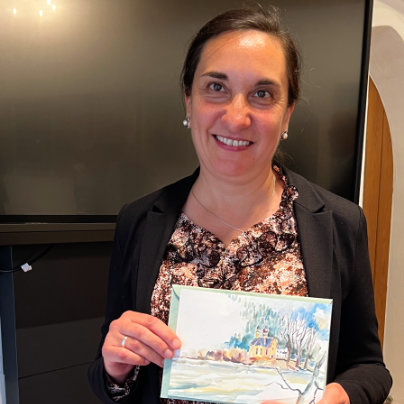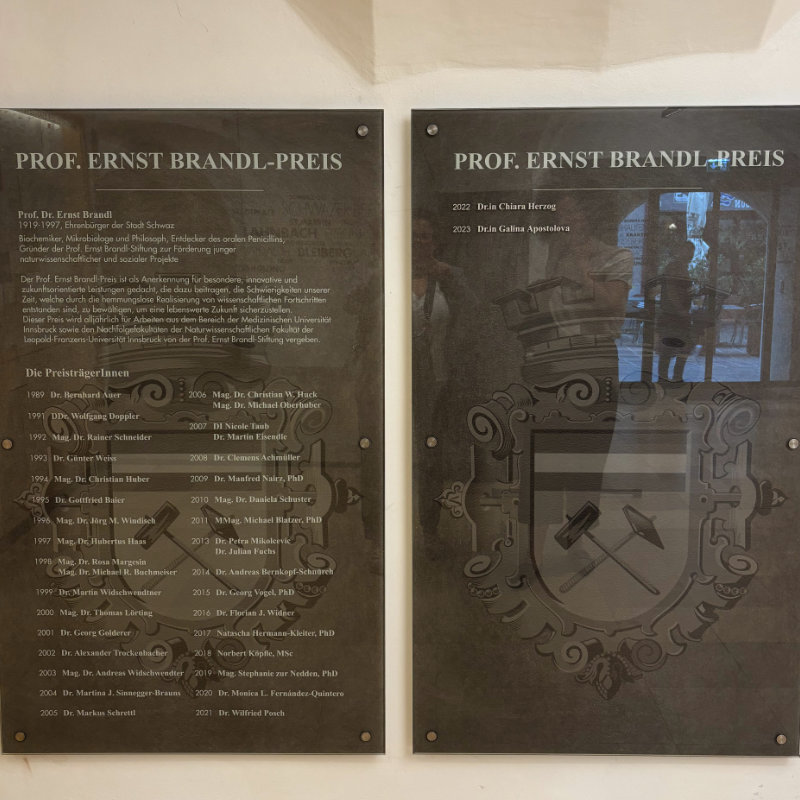Molecular biologist Galina Apostolova received the Professor Ernst Brandl Prize
At the end of January 2024, the research work of scientists from the Med University of Innsbruck on the importance of the SATB2 protein for thinking ability and intelligence attracted the attention of the media. Galina Apostolova was awarded the Prof. Ernst Brandl Prize for this scientific achievement on June 10, 2024 at a festive ceremony in the Swaz Town Hall.
“The spirit of research is alive and well here because of Paracelsus’ long tenure at Swaz,” praised Vice-Chancellor Christine Bandlow at the presentation of the 34th Research Prize of the Prof. Ernst Brandl Foundation. A celebratory atmosphere was created by the sounds of the guitar (Swaz Regional Music School) created by Mayor Victoria Weber, the host of the event. Bandlow thanked founder widow Monica Brandl-Knapp and foundation president, District Captain Michael Brandl, for discovering the life and work of Ernst Brandl for those present and supporting explorers and science: “Research is not only about love and strength. Do. It also requires a lot of perseverance. Prizes are very important for researchers because they get recognition and their achievements are known to the outside world,” he said – and in the direction of the prize winner: “As a neuroscientist, I am happy that the prize goes to someone. Neuroscientist. Galina Apostolova’s work is outstanding and futuristic. In the spirit of Ernst Brandl, it serves humanity.
George Techant, director of the Institute of Neurosciences at the Medical University of Innsbruck, also emphasized this in his acceptance speech: “It is significant that this award is now being presented to a neurologist for the first time. This confirms the importance of neuroscience in our time.
Researchers at Dechant’s Institute have been interested in the SATB2 protein for some time, and Galina Apostolova has been there from the beginning: first, the team worked on a model of the peripheral nervous system, in which they studied neurons of the sympathetic nerve. They found SATB2, whose (over)expression triggers a neurotransmitter switch, i.e. a switch between the messengers acetylcholine and norepinephrine. “It was fascinating for us to see that this protein has the power to influence broad gene regulation. We decided to investigate the molecular mechanisms and functions of SATB2 in the central nervous system,” Apostolova explained.
He is the senior author of the special issue, along with molecular biologist George Techant. Molecular cell Stocks, now responsible for the conception of an award-winning research project. He participated in the analyzes and co-wrote the publication, which produced remarkable results: scientists were able to show that the SATB2 protein directs the specific 3D structure of the DNA structure and has a direct impact on the activity of hundreds of genes. There is intelligence. If it’s missing, the 3D arrangement of genes important for intelligence changes. “When the SATB2 gene is mutated, the intelligence score drops below 40,” explained the award winner. During the project, the researchers were able to demonstrate that SATB2 alters the 3D structure of specific gene regions whose sequence is associated with the risk of neuropsychiatric diseases such as dementia or schizophrenia.
The awardee intends to continue his research in this direction in the future and look at repair mechanisms for DNA double-strand breaks in nerve cells. “Neurons are among the most vulnerable cells in our body. We have them from birth to death, and they don’t reproduce. However, throughout life, their DNA is exposed to many chemical processes that cause DNA double-strand breaks. These are usually repaired. But if something goes wrong – this is the assumption – This can lead to neurodegenerative diseases like Alzheimer’s,” explains Apostolova. Little is known about DNA repair in neurons. The researcher hypothesizes that the protein SATB2 may play an important role in these processes.
Awardee

Galina Apostolova studied molecular biology in Bulgaria and has been working at the Institute of Neurology at the Medical University of Innsbruck since 2003, where she now works as an assistant professor. During his time as a postdoc, he initially focused on gene regulation, chromatin structure and
– arrangement. During this time, he spent time abroad in Sweden, where he worked on technologies for genome-wide studies of gene expression and transcriptome analyses. Back in Innsbruck, he focused on emerging next-generation sequencing before devoting himself to investigating the protein SATB2 in the nervous system.
Professor Ernst Brandl Prize
The Scientific Prize of the Professor Ernst Brandl Foundation, worth 4,000 euros, is awarded alternately for outstanding research work at the Medical University of Innsbruck and the Leopold Franzens University of Innsbruck. The science prize is aimed at work in the field of life sciences that primarily aims at the well-being of mankind, uses environmentally friendly resources, ensures nutrition for people and animals, or involves solving environmental problems. The trust goes to Prof. Ernst Brandl, who died in 1997, and Dr. Hans Margerator developed acid-stable penicillin. This breakthrough made it possible for the first time to administer antibiotics as tablets or syrup.
Research Work: Wahl et al., SATB2 organizes the 3D genetic architecture of cognition in cortical neurons, Molecular Cell (2024). https://doi.org/10.1016/j.molcel.2023.12.024
Previous winners of the Professor Ernst Brandl Prize
Recorded on a plaque in the Swas Town Hall (Photo: MUI/B. Hoffmann-Ammann)
(Innsbruck, June 11, 2024, text and photos: T. Mair)
More links:
Institute of Neurology
Professor Ernst Brandl Prize (Announcement)